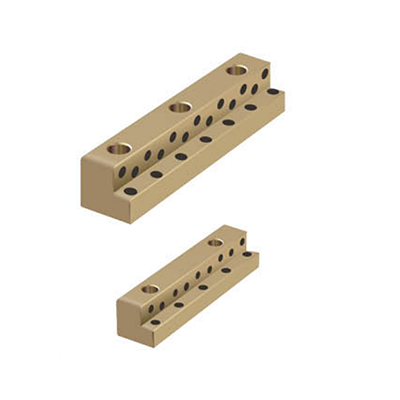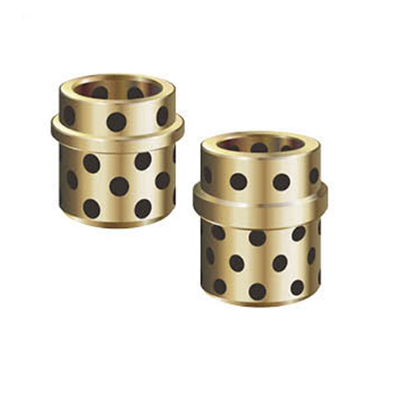1. Low friction coefficient: improve equipment efficiency and reduce energy consumption
The friction coefficient is one of the key factors that determine the operating efficiency of equipment. When traditional metal bearings are running under high load and high speed, due to the high friction coefficient, energy loss and equipment heating will occur, which will affect the performance of the equipment. The composite materials used by Custom Composite Bearings have a lower friction coefficient, which greatly reduces the energy required for the equipment during operation. The reduction in friction coefficient not only reduces the energy consumption of the equipment, but also effectively reduces the burden on the equipment and improves the working efficiency of the equipment.
Compared with traditional bearings, the advantages of composite materials in friction performance are obvious. By reducing friction loss, Custom Composite Bearings can effectively improve the overall operating efficiency of the equipment and reduce energy waste. This low friction performance makes the equipment more efficient and stable in various operations, and also brings considerable energy-saving effects to the enterprise. Especially under long-term high-intensity operation, the friction loss of composite bearings is less, which directly translates into higher production benefits.
2. Wear resistance: extend the service life of equipment
Wear is one of the main reasons for the decline in performance of traditional metal bearings and equipment failures. During long-term use, traditional metal bearings often suffer from wear and corrosion due to friction and load, resulting in a decline in component performance, which in turn affects the operation of the equipment. The composite materials used by Custom Composite Bearings have significant wear resistance, and their material structure effectively suppresses the occurrence of friction and wear.
The wear-resistant properties of composite materials enable Custom Composite Bearings to maintain stable friction performance during long-term use. Compared with metal bearings, composite materials can better withstand the wear pressure caused by long-term friction, avoiding problems such as excessive wear and performance degradation of metal bearings during frequent use. This wear-resistant advantage allows composite bearings to maintain long-term stable operation in various harsh environments, greatly extending the service life of the equipment.
In addition, the wear resistance of composite materials is not only reflected in high-load operation, but also can effectively resist chemical corrosion in different working environments, avoiding the problem of traditional metal bearings being prone to rust and corrosion in special environments. Custom Composite Bearings improves friction performance and wear resistance, so that equipment can be replaced without frequent bearing replacement for a long time, thereby reducing maintenance costs and improving the continuous operation capacity of equipment.
3. Unique properties of composite materials: adaptable to various working conditions
The key to the excellent performance of Custom Composite Bearings under various working conditions lies in the unique properties of composite materials themselves. The basic advantage of composite materials is that they can flexibly cope with different temperature, pressure and friction environments. By combining different raw materials, composite bearings can adjust their characteristics according to specific application requirements to achieve optimal friction performance and wear resistance.
In high-intensity and heavy-load working environments, Custom Composite Bearings show unique advantages. Composite materials can not only maintain low friction coefficients and excellent wear resistance, but also adapt to high-load operation and resist wear and corrosion in long-term use. This adaptability allows Custom Composite Bearings to be used not only in traditional industrial equipment, but also in more complex working conditions to maintain excellent performance and meet various working scenarios with different needs.
The flexibility of composite materials is not only reflected in their adaptability to changing working conditions, but also in their material design. By customizing according to the conditions of use, composite bearings can provide optimal performance under different temperatures and loads, allowing them to work stably in high-temperature, high-pressure or highly corrosive environments. This versatility makes Custom Composite Bearings more and more widely used in high-end equipment and special environments.
4. Self-lubricating properties of composite materials: Reduce maintenance frequency
Maintenance costs and downtime are important factors affecting the operating efficiency of equipment. Traditional metal bearings require regular lubrication and maintenance, otherwise it will lead to increased friction, increased wear, and even equipment downtime. Custom Composite Bearings' composite materials generally have good self-lubricating properties, which means that in many cases, composite bearings do not require frequent lubrication or regular grease changes.
The self-lubricating property effectively reduces the dependence on external lubrication systems and reduces the complexity and cost of lubrication maintenance. Especially in environments where conventional lubrication is not possible, the self-lubricating properties of composite bearings can continuously maintain stable friction performance and reduce the risk of failure that may be encountered in traditional lubrication systems. This feature makes the operation of the equipment more stable, and the maintenance cost is also reduced, further improving the economic benefits of the equipment.

 English
English Español
Español



